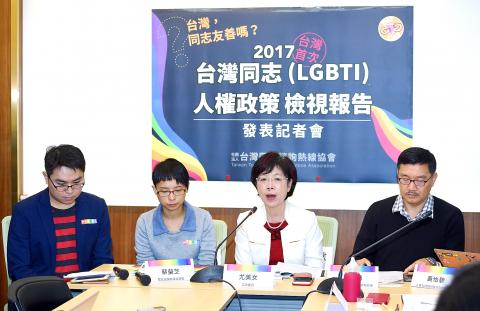The Taiwan Tongzhi Hotline Association yesterday released its Taiwan LGBTI Rights Policy Review for last year — which it described as the first comprehensive report on the nation’s policies regarding lesbian, gay, bisexual, transgender and intersex (LGBTI) people — and which suggests ways to improve gender equality education and address hate crimes, workplace discrimination, same-sex marriage, long-term care and transgender and intersex peoples’ rights.
The report was compiled through extensive literature reviews, field research and interviews with experts, and overhauls current policies on LGBTI rights, the association said.
“There has never been a comprehensive report on the government’s LGBTI policies,” association secretary-general Tsai Ying-chih (蔡瑩芝) said, adding that “previous reports on those policies are either limited in scope or lacking in statistical evidence.”

Photo: Liao Chen-huei, Taipei Times
“The government has constantly ignored the LGBTI community and because of that LGBTI people are not sufficiently protected by the law,” she said.
The report found that, while many laws and regulations fail to address the rights of LGBTI people — such as the Civil Code, which excludes same-sex marriage — some laws directly contribute to discrimination.
One example is “the standards for blood donors” issued by the then-Department of Health — now the Ministry of Health and Welfare — that bans men who have had sexual intercourse with another man from donating blood, Tsai said.
The problems are compounded by a lack of awareness about LGBTI issues in law enforcement and backlash from groups opposed to LGBTI rights, Tsai said.
Based on the report, the association called on the government to improve legal protections for LGBTI people and to raise awareness of LGBTI issues in law enforcement agencies.
The government should take a person’s gender and sexual orientation into consideration when conducting surveys and research to make policies more LGBTI-friendly, Tsai said.
The association also urged the government to devote more resources to educating the public about gender equality and to avoid policies and wording that reinforce gender stereotypes.
“President Tsai Ing-wen (蔡英文) has described her government as one that cares about human rights. We hope that the Tsai administration can do more than include human rights in their slogan,” Tsai Ying-chih said.
“Since the Council of Grand Justices ruled that same-sex marriage should be legalized, marriage equality appears to have been realized, but the report shows that discrimination is still prevalent,” Democratic Progressive Party Legislator Yu Mei-nu (尤美女) said.
The government is to look into the suggestions, Department of Gender Equality official Chao Hui-wen (趙惠文) said, adding that on Jan. 3 last year, it added policies on sexual minorities in its Gender Equality Policy Guidelines and has since been working on promoting the rights of LGBTI people, although it might take a while for society to change.
The complete report is available at the association’s Web site hotline.org.tw.

Hong Kong-based American singer-songwriter Khalil Fong (方大同) has passed away at the age of 41, Fong’s record label confirmed yesterday. “With unwavering optimism in the face of a relentless illness for five years, Khalil Fong gently and gracefully bid farewell to this world on the morning of February 21, 2025, stepping into the next realm of existence to carry forward his purpose and dreams,” Fu Music wrote on the company’s official Facebook page. “The music and graphic novels he gifted to the world remain an eternal testament to his luminous spirit, a timeless treasure for generations to come,” it said. Although Fong’s

China’s military buildup in the southern portion of the first island chain poses a serious threat to Taiwan’s liquefied natural gas (LNG) supply, a defense analyst warned. Writing in a bulletin on the National Defense and Security Research’s Web site on Thursday, Huang Tsung-ting (黃宗鼎) said that China might choke off Taiwan’s energy supply without it. Beginning last year, China entrenched its position in the southern region of the first island chain, often with Russia’s active support, he said. In May of the same year, a Chinese People’s Liberation Army Navy (PLAN) force consisting of a Type 054A destroyer, Type 055 destroyer,

Actor Darren Wang (王大陸) was questioned by prosecutors for allegedly orchestrating an attack on a taxi driver after he was allegedly driven on a longer than necessary route in a car he disliked. The questioning at the New Taipei City District Prosecutors’ Office was ongoing as of press time last night. Police have recommended charges of attempted murder. The legally embattled actor — known for his role in the coming-of-age film Our Times (我的少女時代) — is under a separate investigation for allegedly using fake medical documents to evade mandatory military service. According to local media reports, police said Wang earlier last year ordered a

POLICY UNCHANGED? Despite Trump’s remarks, US Secretary of State Marco Rubio assured that US policy toward Taiwan has remained consistent since the 1970s US President Donald Trump on Wednesday again refused to make clear his stance on protecting Taiwan from a hypothetical takeover by China during his presidency. Asked by a reporter during a Cabinet meeting whether it was his policy that China would never take Taiwan by force while he is president, Trump declined to give a definitive answer. “I never comment on that,” he said. “I don’t comment on it because I don’t want to ever put myself in that position.” Trump also reiterated that he has a “great relationship” with Chinese President Xi Jinping (習近平) and said that Washington welcomes good relations with